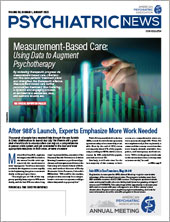There is no doubt that as technology grows exponentially more advanced, highly digitized mental health treatment is the future. So how do physicians elicit standards in the Wild West of new ideas and app development while simultaneously protecting patient identity? Recently, at APA’s 2022 Mental Health Innovation Exchange (MHIE), medical leaders who work at the interface of technology and health care came together to address today’s challenges in psychiatric care.
Voices such as that of Ipsit Vahia, M.D., associate chief of geriatric psychiatry at McLean Hospital, director of digital psychiatry translation, and an assistant professor of psychiatry at Harvard Medical School, have become key in leading this conversation. According to Vahia, many users have experienced their data being used or sold to further advance the development of a company. He explained that as apps begin to store private health information, the concept of data security and app quality has become a more pressing issue.
He shared at the MHIE: “As clinicians, if we are using a tool, we need to know [what companies will do with patient data]. We need to educate our patients about this. We try to do that in the context of our clinical work or our clinical translation, and frankly, not doing so is no different in principle from prescribing someone a medication and failing to discuss the side effects or the risks from that medication.”
His colleagues, John Torous, M.D., M.B.I., director of digital psychiatry at Beth Israel Deaconess Medical Center in Boston and chair of APA’s Committee on Mental Health Information Technology, and Olu Ajilore, M.D., Ph.D., a professor of psychiatry at the University of Illinois at Chicago, echoed this sentiment and shared their own thoughts at the MHIE regarding how to best protect patient integrity while still exploring the space of technological advancement.
Vahia works on the edge of this space utilizing new technology while preserving patient privacy. He identified a technology being developed by Dina Katabi, Ph.D., M.S., and her colleagues at MIT that uses radio waves to track movements of an object throughout a room (“
‘Invisibles’ May Provide Needed Data on Compromised Patients”). Similar to the way bats use sound waves to determine object location, this technology “emits radio waves and then can track changes in movement of objects within their range, typically in a single room, based on how these radio waves bounce off.” This technology allows monitoring of patient activity without something more invasive like constant video monitoring.
Through a trial at an assisted-living facility, Vahia explained, researchers used radio waves to track metrics that do not involve personal sensitive information, such as sleep patterns, gait speed, gait patterns, and even breathing and heart rate. Two prime examples of how this can be beneficial for patients were shown in their study by, first, being able to track decline in a patient’s daily activity and making a necessary medication adjustment based on this decline. Second, the radio waves were able to pick up on a new symptom of restless legs while the patient slept, allowing for medication adjustment and resolution of this side effect.
Vahia stated that “the model of precision care, which is when technologies are used right, really gives us very detailed individual-level data that can guide decision-making, and I think simultaneously, it allows us to create highly personalized intervention.”
Torous commented on various organizations that have made efforts to screen and standardize medical apps: “Having a group like the Society of Digital Psychiatry is so important, because again, you really can get quality only with standards.”
He explained that as a starting point, many clinicians through APA and The Argus Foundation have developed mindapps.org to evaluate data points from 700 different apps marketed as mental health apps. Focused app screening and standardization may offer a solution to the Wild West of medical digital app development by bridging product quality and patient identity protection. ■
More information about the future of mental health technology will be presented at APA’s 2023 Annual Meeting in May.


